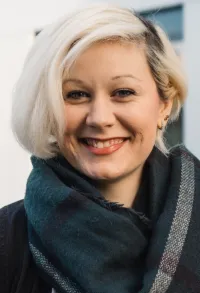
Elena Schick has graduated as Bachelor of Arts in Russian Culture. Her other discipline was Comparative Literature Studies.
Wieso haben Sie sich damals für Ihr Studienfach entschieden?
Frankly, I just needed a second subject, and as I am originally from Russia, Russian Culture seemed the obvious choice.
An welchen Stellen haben sich die Erwartungen an Ihr Studienfach erfüllt, an welchen nicht?
I didn’t have any expectations. The subject was a “stepchild” at first. By and by, however, the lecturers have managed to inspire enthusiasm for the Russian culture and especially literature.
Was macht Ihnen in Ihrem Fach am meisten Spaß?
The cultural-historical synopses that are mandatory in the first four semesters were what I enjoyed most. Seminars dealing with diverse topics are very interesting, too. I specialised in Russian literature – a field of study that is fortunately extensively covered by the seminar curriculum.
Was war bisher die größte Herausforderung?
The language. Even though I’m a native speaker, German has long been my first language. Thanks to the entry-level test, students who have a basic grasp of the language don’t start from scratch; rather, they attend so-called compensation courses that help them improve their language abilities. It is possible, of course, to study Russian Culture without any previous knowledge of the Russian language. In that case, you will start by learning the alphabet.
Was wollen Sie einmal damit werden?
By studying Russian Culture, I have acquired an additional qualification that will later help me win brownie points in my professional life. Working as a translator would not be my first choice, at least not full-time, but working at a publishing house that publishes Russian-language books would be an option.
Welche Tipps geben Sie den Leuten, die auch überlegen, Ihr Fach zu studieren?
If you don’t know any Russian at all: don’t let this put you off! Lectures and seminars are held in German. In the seminars, you will be expected to try to read texts in the original language, but the lecturers take non-native speakers into account and provide both versions (Russian and German), if possible.

